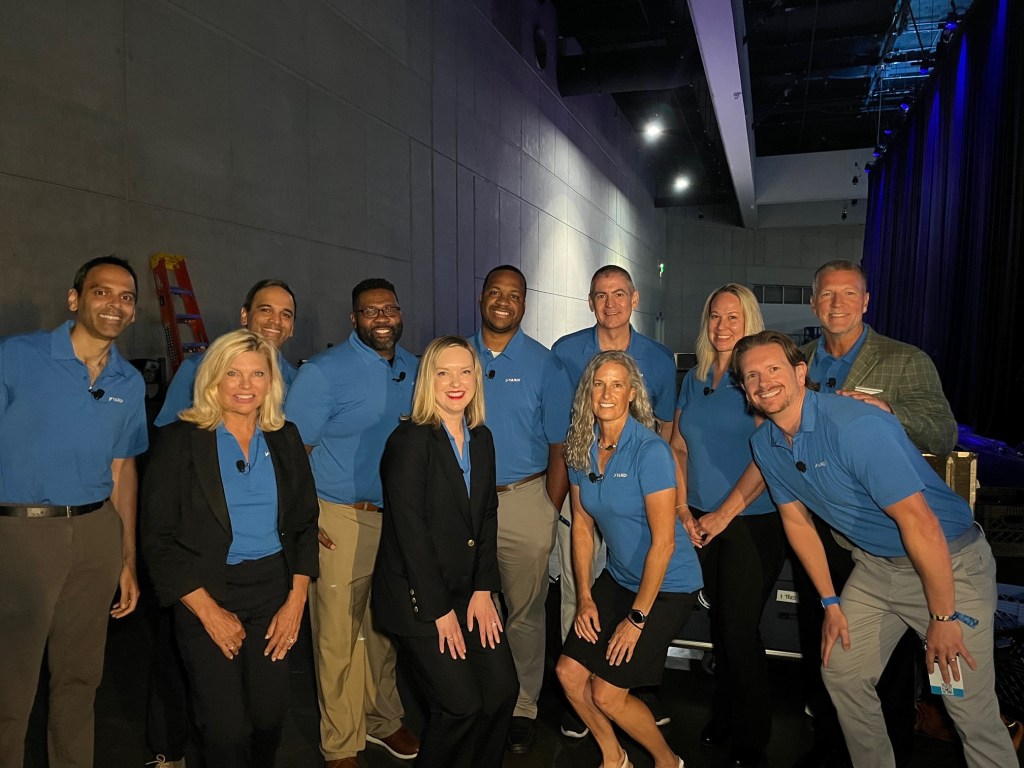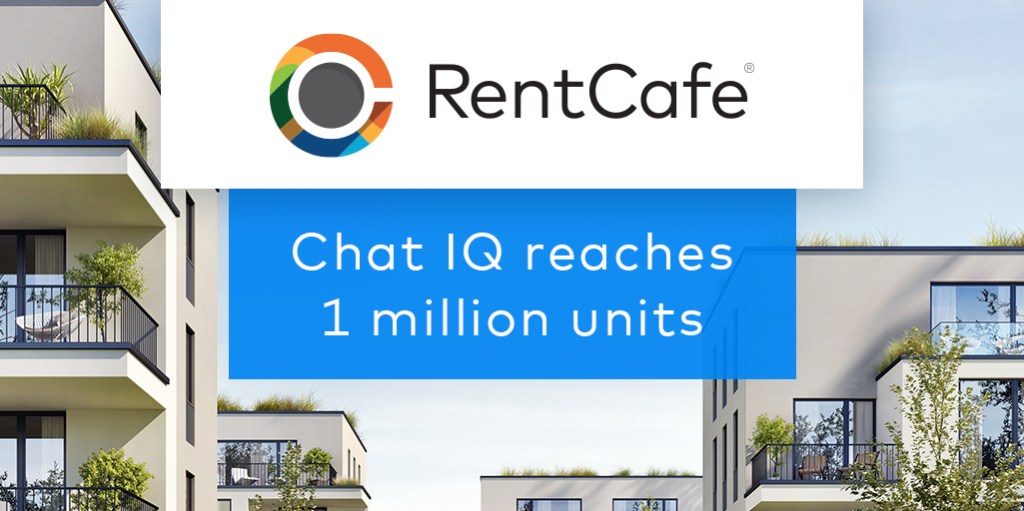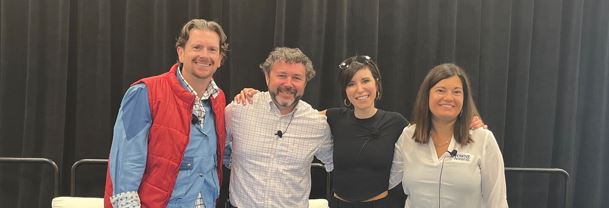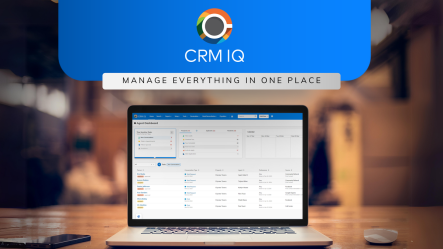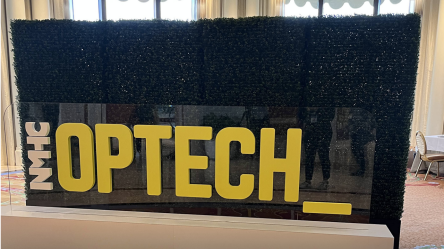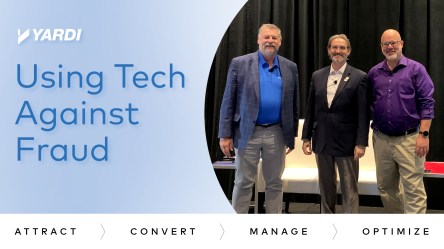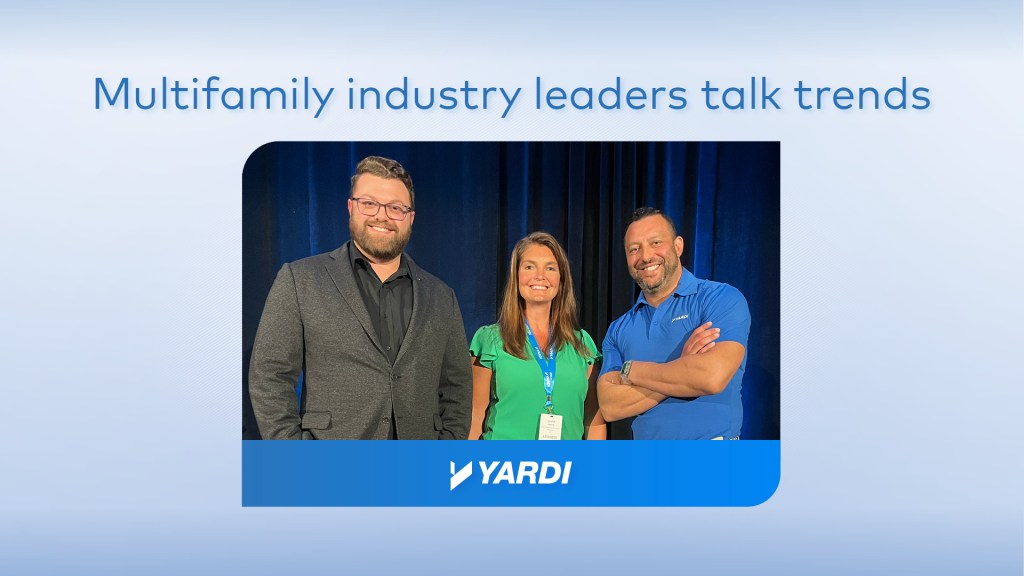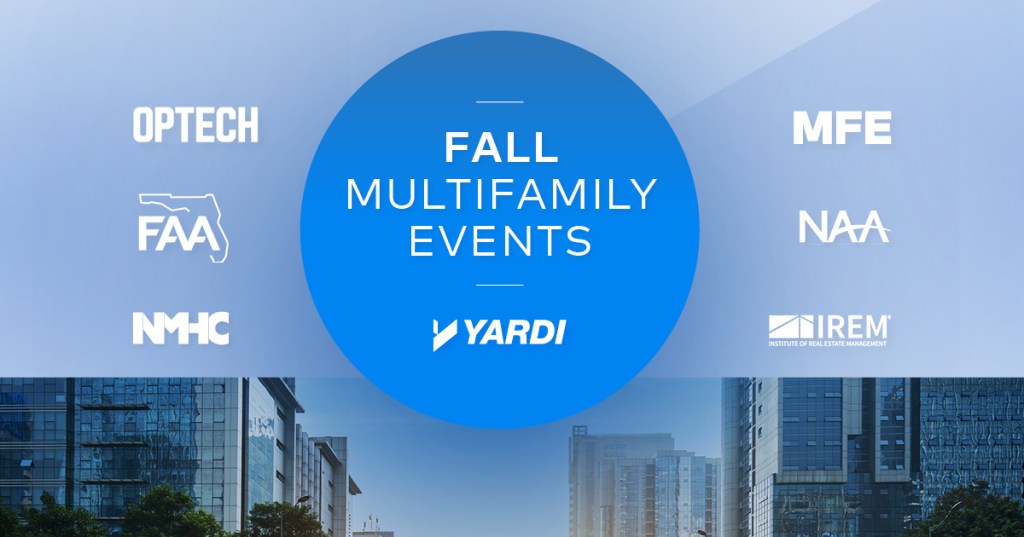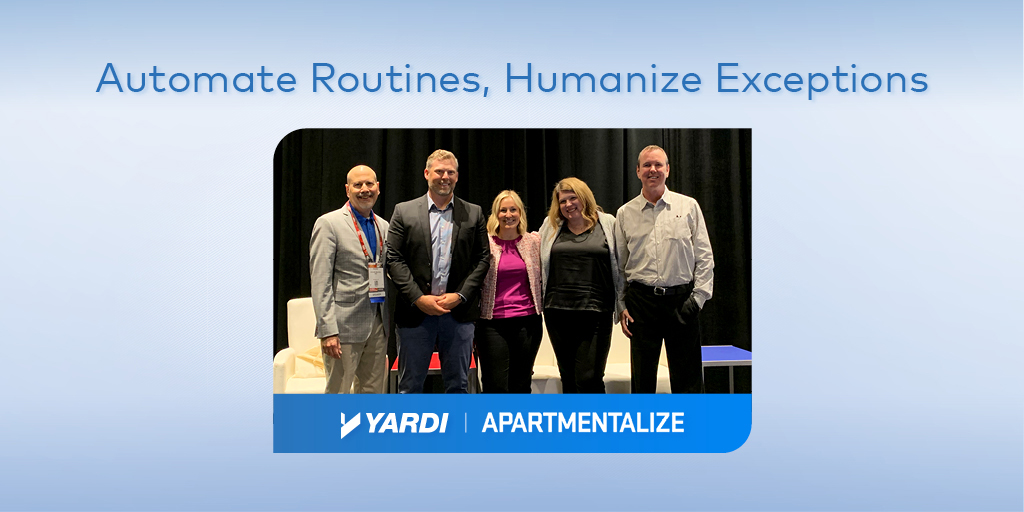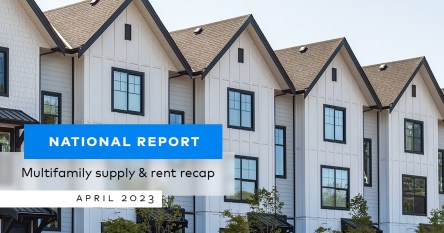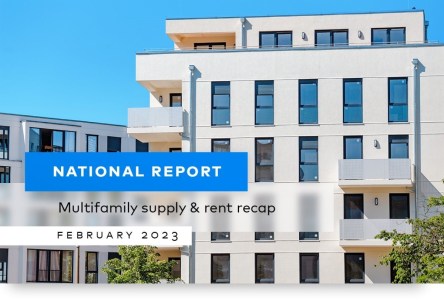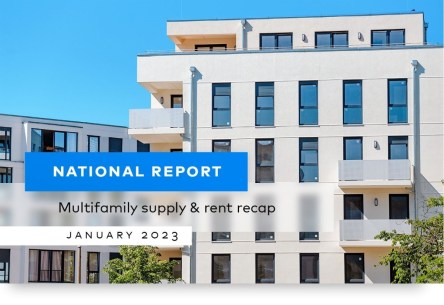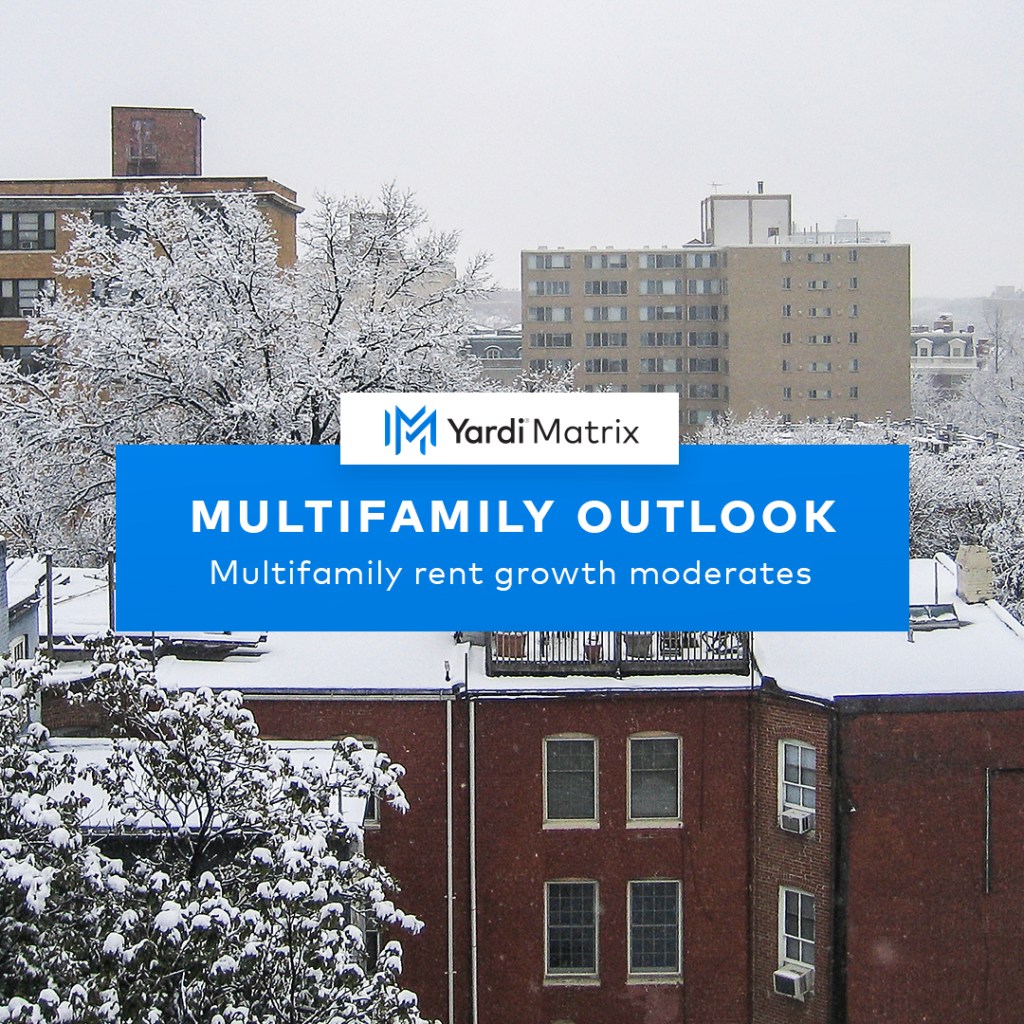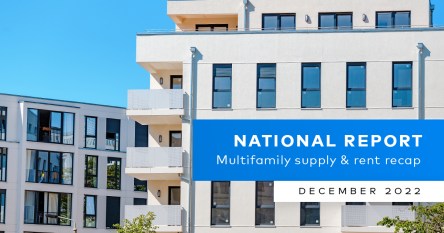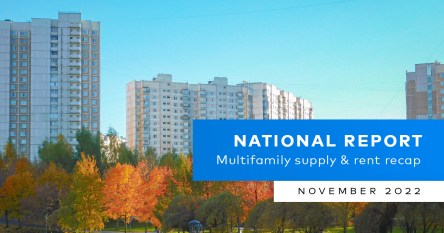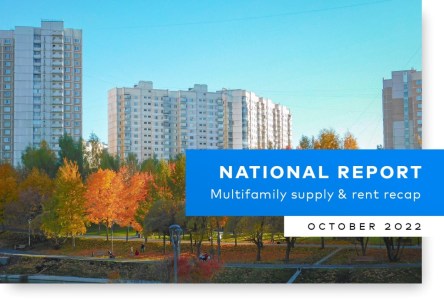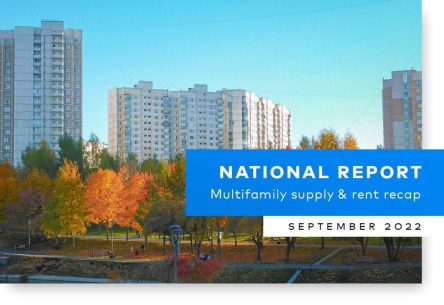2024 is a big year for Yardi, and it’s not just because we’re celebrating 40 years in business. This year marks an exciting shift in our innovation process, exemplified by the new AI solutions presented during YASC 2024’s opening spotlight session for multifamily. Here’s a recap of innovations and features unveiled during the event. Marketing with AI Ready to streamline content creation and optimize marketing spend? As Esther Bonardi, Yardi vice president of corporate marketing and REACH by RentCafe, put it, “AI is everywhere, and it’s impacting all of our development from the time renters start looking for their apartment, and all the way until they’re renewing their lease.” Here’s a peek at new AI-driven solutions to help you drive more quality prospects. Simplifying content creation with Creator by Virtuoso The new Creator by Virtuoso — included in Marketing IQ Genius — uses AI to generate and schedule content for property websites. Whether it’s page narratives, blog posts or Google Business Profile updates, content creation has never been easier. Marketers can now update websites and social feeds with minimal effort, ensuring they stay competitive in the digital landscape. Data-driven budgeting and strategy Marketing IQ Genius also includes more advanced SEO and PPC reporting, as well as PPC budget recommendations powered by machine learning. Get strategic suggestions that help you make informed decisions about your advertising spend. Allocate budgets more effectively and drive better results based on real-time data and insights. Speed to lease: Accelerating the customer journey with AI “Days equal dollars when it comes to vacancy loss,” Paul Yount, industry principal, said to a crowd of multifamily professionals — but not before he somehow weaved a baby picture of himself onto a slide. (It all connected to his YASC session, “Back to the Future of Leasing and AI.”) Speed is everything when it comes to turning your prospect into a resident — and our AI initiatives are making that process even faster. Here are some updates that will help you reduce vacancy loss. More efficient leasing Chat IQ, powered by Yardi Virtuoso, provides instant, personalized responses to your customers that keep them engaged and informed throughout their leasing journey. Plus, our income and identity verification solutions streamline approvals, ensuring maximum speed when it comes to converting an inquiry into a lease. Self-serve maintenance Our new self-serve maintenance feature guides residents through minor fixes, reducing the hassle associated with maintenance and the workload on property managers. This not only enhances resident satisfaction but also frees up time for teams to focus on more strategic tasks. Yardi Energy Yardi Energy has exciting new updates in store to help you manage energy usage more efficiently, so you can reduce cost while aligning with environmental best practices. Enhancing the resident experience We’re also rolling out new innovations that will make your resident experience even better. Get ready for increased resident satisfaction and renewals. Rewards by RentCafe Resident retention is key to long-term success, and our new rewards program for residents is designed to do just that. Rewards by RentCafe incentivizes your residents to pay rent on time by rewarding them for on-time rent payments and subscriptions to Resident Services by ResidentShield. Points can be redeemed for fun things like travel and shopping, helping you enhance satisfaction. Resident Services by ResidentShield As just mentioned, we’ve rolled out a comprehensive suite of resident services that cater to every stage of the resident lifecycle. But the highlight is our move-in tracker, which simplifies the move-in process for residents by giving them one place to sign up and activate all the essentials, like Wi-Fi and electricity. This helps them feel at home from day one, and gives you bonus points for a seamless experience — without extra effort on your part. The roadmap A preview of enhancements you can take advantage of now, or soon! Chat IQ It just keeps getting better with Chat IQ. This...
1 Million Units of Chat IQ
Top Choice for Owners + Operators
Chat IQ is helping one million units with seamless communication! To celebrate this milestone, we spoke with Chat IQ’s biggest fans: Top property managers in the industry. Discover why the industry loves this powerful bot and how it all creates a domino effect when it comes to driving efficiency in their organization. Backing it up with the numbers “We’re thrilled about the unit milestone,” said Paul Yount, industry principal at Yardi. “It means that our valued clients trust us with their AI bot needs.” This year to date, Chat IQ has handled over four million inbound messages for our clients and their agents. This resulted in over 225,000 hours saved, according to Yardi data. One of the standout benefits is the improvement in what Yount refers to as “speed to lease,” or the time it takes for a prospect to become a resident. Chat IQ accelerated the time it took for a prospect to sign a lease by up to seven days. “Days equal dollars when it comes to vacancy, so this is really improving not just the efficiency of the onsite teams, but the community and client’s bottom line,” Yount concluded. About Chat IQ Chat IQ answers prospect and resident questions around the clock through chat, email, text and calls. It frees up your staff to focus on higher-level activities they enjoy more than answering repetitive questions. Chat IQ instantly answers almost all customer base intents, connects customers to real agents if needed and now includes support from Yardi when your agents are unavailable. Our clients say it best Chat IQ has garnered praise from top property managers for its outstanding performance and benefits it brings to their operations. Here are some of the key advantages that make this AI-powered bot an industry favorite. Enhanced efficiency Chat IQ can answer 97 percent of questions without needing to learn anything new, eliminating the need for constant data reentry. Carrie Bakke, senior systems analyst at the Lund Company, shares her experience, stating, “In the first six months after we rolled out Chat IQ, we had an average of three leases per month that were generated entirely from the bot. It freed up approximately six hours a day spent answering questions. And all of that information has been provided without our site teams having to lift a finger.” Freed up time for leasing agents Chat IQ allows community team members to do more valuable and meaningful work, while providing the immediacy today’s consumers expect. “Chat IQ is there day or night, business day or holiday,” said Yount. The ability to operate around the clock has made a significant impact on leasing teams. Leslie Henry, SVP at Towne Properties, notes, “After we implemented Chat IQ, our site teams quickly realized how useful it was in gaining back time. They love how it filtered out less promising leads in the beginning. We let them customize some aspects of the responses so there was more of a personal human touch.” Proven ROI For others, Chat IQ is simply about the return on investment. Jason Gherardini, SVP of IT at Sares Regis Group, highlights the value Chat IQ brings, saying, “We get true ROI with Chat IQ from the first conversation, discussion, all the way to lease. It’s a good product.” And it’s getting even better with a new AI update We’re excited to announce that Chat IQ is now more efficient, more impactful and more streamlined with several AI enhancements: Customizable brand tone: Chat IQ matches your company’s unique voice and style, creating consistency in each conversation. OpenAI ChatGPT integration: Prospects and residents will enjoy more natural, human-like interactions. Better interactions: Chat IQ now responds dynamically to questions, moving beyond templated responses to provide a more interactive experience. Multi-question handling: Seamlessly address multiple questions in a single chat, such as “What’s the pet policy, the nearest dog park and the pet deposit?” New voice...
Back to the Future at NAA
Apartmentalize session recap
It was a film buff’s paradise last week at the National Apartment’s Association biggest tradeshow, Apartmentalize. In addition to the Yardi Theater showings, eventgoers had the opportunity to attend a session titled “Leasing: Back to the Future with AI & Human Touch.” Led by Paul Yount, industry principal at Yardi, the discussion featured Anne Baum, director of marketing at Towne Properties; Diana Norbury, SVP of multifamily operations at Pillar Properties; and Tyler Lucas, director of marketing technology at Gates Hudson. (Pictured, right.) Onsite staff were also presented virtually, with Emma Akervold, assistant property manager at Pillar Properties and Leslie Armstrong, area manager at Towne Properties, sharing their thoughts on Chat IQ, Yardi’s virtual assistant that answers to prospects and residents. Back to the future of customer service & technology Yount set the stage with a “Back to the Future” theme, even donning Marty McFly’s iconic vest. The theme highlighted how modern renters want traditional customer service nostalgic of the past, but with the efficiency of cutting-edge technology one could expect from the future. (But the good news is that this kind of innovative technology is available today.) “In the past, hands-on customer service meant compromising staff roles. Great service but very inefficient,” Yount explained. “But today, with the right technology, you can have that great hands-on customer experience and leverage efficiency at the same time.” Yount demonstrated how customer expectations for excellent service have remained constant, but the means to deliver it have evolved. Drawing parallels between scenes from “Back to the Future” and property management, the session emphasized AI and technology’s role in improving human-centered service and overall efficiency. Reshaping & elevating onsite roles The panel discussed how AI and automation reshaped onsite roles to focus more on higher-priority tasks. AI-driven solutions help staff handle repetitive and manual tasks, lightening workloads. This gives teams more time to focus on more meaningful, high-value activities, which leads to better customer experiences and employee satisfaction. Additionally, AI can instantly provide leasing teams with the information they need to enhance performance. “It’s performing faster than any of us can,” Lucas emphasized. But AI’s powerful capabilities can’t completely replace human abilities — it just enhances them. Panelists agreed that AI and automation enable property managers to reallocate their resources more effectively, ensuring that human talent is utilized where it can have the greatest impact. How AI transforms operations Speakers shared their experiences with Chat IQ, highlighting improvements in lead conversion rates and operational efficiency. They noted a significant reduction in the time between lead inquiries and scheduled appointments, resulting in faster lease conversions and reduced vacancy periods. “We’ve seen a huge increase in inquiries being scheduled without us having to initiate that conversation,” Akervold, assistant property manager at Pillar Properties, said. “I can’t emphasize enough the value that I find in it.” The benefits of AI extend beyond operational efficiency—they also power faster response times and improved lead management, which directly contribute to better occupancy rates and revenue performance. Team & customer reactions to AI Integration While skeptical at first, staff members like Leslie Armstrong of Towne Properties eventually embraced AI for its ability to handle routine tasks, freeing them to focus on resident engagement and customer satisfaction. This change led to improved team morale. “Chat IQ makes our customers feel like we’re always present even after business hours,” Armstrong said. “When I’m at home with my family, I know that my offices are still being supported.” As staff attitudes shift towards the support of AI, operators can also look towards using AI to combat staffing issues. “I think what nobody talks about when you’re short-staffed are that the people that are left behind. It’s a lot of burnout. They feel a lot of the pressure and so it allows you to be a little bit more flexible with operations,” Norbury noted. Choosing the right AI platform It’s no secret that the multifamily...
The Ultimate CRM for Multifamily...
5 reasons to choose Yardi
What should your CRM system do for you? At Yardi, we should believe it should do, well, everything. That’s why we’ve built one powerful solution that helps you seamlessly do it all — from managing leads to collecting rent payments — without breaking the bank or disrupting your workflow. No matter your portfolio size, here are five reasons to consider one dashboard for all your property management needs. 1. You can do virtually anything from a single dashboard When we said your property management software should let you do everything, we meant it. In one location, you can: Gain full visibility into every prospect, applicant and resident workflow. See when a prospect has scheduled a tour, when an applicant completed their screening, when a resident has renewed their lease and more! Think of anything that’s related to the customer journey, and view it all in one, user-friendly screen. Manage all transactions, interactions and relationships. In a connected platform, access communication records (emails, call transcripts, texts and chats) in one place. Cross-portfolio insights makes it easy to determine if a customer has resided at any of your properties in the past, giving you complete oversight. And did we mention you can manage and streamline your AR/AP processes in the same system, too? This functionality leaves no gaps in your process and offers a comprehensive solution for all your operational needs. Drive overall efficiency across your portfolio. Looking for a way to increase resident satisfaction, simplify onboarding and empower employees with more meaningful tasks? Streamline your processes by utilizing a single platform that enhances customer familiarity and navigation, reducing friction along the way. 2. User-friendly dashboards If you haven’t heard already, we’ve made some major upgrades to our CRM’s user interface. Designed to prioritize the user...
Prevent Fraud + Bad Debt
How Tech Can Protect Communities
The multifamily industry has long since been a lucrative target for fraudsters, and recent years have only made it worse. While online leasing has streamlined the leasing journey for many applicants, it has also opened the door for bad actors to manipulate the system, resulting in unpaid rent and bad debt for multifamily owners. The good news is that you can deter fraud from the very start. Read on to explore how technology can enhance security and efficiency across your online leasing process. The rise of real estate fraud Real estate crimes have increased each year since the pandemic. The FBI’s internet crime reports the total reported internet-based real estate crimes soared from $213 million in 2020 to a staggering $397 million in 2022. The multifamily industry was no exception, with many fraudsters taking advantage of the rising popularity of online leasing. According to the Pulse Survey conducted by NMHC, 93.3% of survey respondents reported experiencing fraud within the last 12 months with 70.7% seeing an increase in the same time period. Fraudulent documents have evolved to become increasingly complex. It is now more challenging to detect false applications without the help of technology. And in this digital age, relying on onsite teams to play detective is not practical or efficient. Combatting fraud with technology With the help of AI and automation, tech can detect fake IDs and altered paystubs instantly, stopping criminals who are trying to exploit the system. Of the options out there, consider a system that is easy to use, can easily be trained and can seamlessly connect to your property-level data. Overall, you want to choose tech that makes it not only easy for quality applicants to apply, but also creates an uninterrupted experience from prospect to resident. How fraud prevention tech can benefit everyone involved Implementing an automated screening solution is not just about preventing fraudulent applicants during the leasing process. It’s a proactive approach that can be integrated into various stages of your customer’s lifecycle. Easy touring. Enabling ID verification before in-person and self-guided tours enhances security before your prospect enters your community. It can also be used to manage resident visitor and vendor access, enhancing security within your communities. Faster leasing. If you implement a connected identity verification solution that seamlessly guides prospects into the applicant stage, prospects who have already verified their identity for a tour won’t have to repeat the process if they proceed with an application. This makes it frictionless for prospects to complete their application and streamlines the approval process for your staff. Staff efficiency. Using technology to automatically cross-check information and detect any inconsistencies that may indicate potential fraud is a huge game-changer for leasing teams. But the tech doesn’t stop at identity verification. You can also leverage automation to authenticate applicant incomes, further ensuring that your applicants are able to afford the rent. Not only does this decrease your staff’s manual workload, but it’ll also remove the burden of being detectives. Ongoing verification. Be sure to provide residents with access to a secure portal where they can update their information as necessary. This contributes to a seamless and secure ongoing resident experience. As the multifamily industry navigates the challenges posed by rising internet-related real estate crimes, technology emerges as both a solution and a deterrent. Online leasing, when coupled with robust ID and income verification solutions, accelerates the leasing process and strengthens the industry against fraud. Discover how Yardi’s screening and fraud solutions, ID Verify and Income Verification, simplifies screening for your staff and future residents. Dweck Properties saved up to 30 minutes per applicant during the application process. Want to see it for yourself? Watch this short on-demand webinar on how you can automate ID and income verification to make screening easier for your prospects, staff and...
Modernize the Customer Journey
Tools & strategies to get ahead in 2024
In the dynamic world of multifamily real estate, implementing the latest technology is not just an option, it’s a necessity. Modernizing your leasing strategy is more important than ever as renters increasingly demand instant, automated and personalized experiences. But above all, they value experiences that put them in control of their journey. We’ve identified five key tools and strategies that you can implement or enhance in 2024, putting your customers in the driver’s seat while elevating your NOI. These solutions not only enhance the customer experience, but also streamline your onsite teams’ efficiency. Let’s dive in! 1. Chatbots as virtual leasing assistants Chatbots are revolutionizing customer interaction across industries, and the multifamily industry is no exception. Chatbots can free up leasing teams by fielding the bulk of common inquiries, but what’s the point if it only creates more hassle for your teams with multiple logins and disjointed data? As customers expect more instant gratification and answers, it’s more important than ever to leverage a chatbot that can do more than just chat — the right bot will act as a true extension of your team, answering chats, texts, emails and calls in the voice and tone your organization prefers. Additionally, a chatbot that has access to your property and customer data can help you provide consistent customer experiences from the start. Chat IQ has direct access to Voyager data, providing accurate unit availability, pricing and tour appointment schedules. Here’s a quick overview of what else the right chatbot can bring to the table: Generate conversions with prompt customer service and automated tour scheduling Improve resident retention by facilitating rent payments, maintenance requests, lease renewal notifications and more Reduce operating costs by automating repetitive tasks and streamlining workflows 2. Self-guided tours to empower prospects Want more interested prospects, a speedy leasing process and fewer vacant units? Implementing self-guided tours can help. Self-guided tours offer a more convenient and flexible way for prospects to explore units. Unlike traditional tours that require a leasing agent to be present, self-guided tours can be booked outside of leasing office hours. Plus, you don’t have to hire additional staff. Onsite teams also benefit greatly from self-guided tours, shifting the focus from just showing prospects around to more strategic efforts for enhancing the customer experience. This focused approach not only generates more high-quality leads, but also paves the way for job satisfaction and subsequently, better staff retention. 3. Automated screening for better efficiency and security Your leasing agents are leasing agents, not detectives. Automated screening tools eliminate the need for tracking down lost papers, tedious back-and-forth emails and the responsibility of ensuring whether documents are legit. Automated screening is also a win for prospects. Facial recognition and automation technology reduce obstacles prospects face in trying to apply for an apartment, accelerating their journey to becoming your resident. The same goes for technology that allows prospects to verify their income on the spot. With technology that seamlessly allows prospects to take a selfie and upload a paystub, they’ll be able to get approved for that unit faster. 4. Centralized data for operational excellence Centralization is more than just a buzzword. It’s a strategy that has the potential to yield lower costs, increase efficiency and increase satisfaction for both renters and staff. But a long-term strategy to centralization requires a more nuanced approach. When considering how to centralize, focus on your onsite staff’s expectations, how roles will be specialized and the structure of your centers of excellence. Kim Young, vice president of shared services at Fogelman Properties, suggests refining your automation strategy before jumping head-first into the centralization hype. “Until you know what humans don’t have to do, you can’t know how and where to centralize,” she said. No matter how you go about it, a thoughtful approach to centralization paves the way for long-term operational efficiency. Need a place to start? CRM IQ gives you visibility into...
Think Outside the Box...
Spice up Resident Events
Unconventional resident events can add a fresh and exciting dimension to a property management company’s community-building effort. The benefits of stepping outside the traditional event model will help to retain residents and attract new ones. Unique gatherings can strengthen the sense of community among residents. Here are some types of think-outside-the-box events to explore over the holiday season. Spice up the community with Escape Room Challenges or Mystery Dinners. Transform common areas or vacant units into escape rooms where residents work together to solve puzzles and mysteries. Include a mystery dinner to solve the crime during the meal, then have residents go out and explore around the building. Add a scavenger hunt and have prizes at the end for the winners. Plants and Pets. Plants are so good for the environment and cleanse the air around them. Arrange a gardening event where residents exchange plants, seeds or gardening tips. Microgardening is popular in smaller apartments, so maybe provide a small basil plant to start residents out with. Don’t forget about the four-legged residents. Look for a local pet mobile photographer for the holidays so residents can get their holiday cards made. Culinary Adventures. Delve into the world of cooking classes as a resident event. Cooking classes can enhance residents’ culinary skills, foster connections and offer a fun and educational experience. Find a local chef or culinary expert to lead the classes and provide some sample recipes or themes for these classes. For example, set up some spaces in the common area to learn how to make fresh homemade pasta, which can be a romantic date night for those during Valentine’s Day. Another example would be to decorate holiday cookies together. Provide the cookies already baked, then have various colors of icing in pipping bags...
OPTECH 2023
AI-Powered, Human-Centered
From Nov. 1-3, NMHC OPTECH brought together the brightest minds and the latest innovations in the multifamily industry. Las Vegas was the hub of important conversations surrounding the present and future of real estate technology. Here’s a quick recap of the event, including more information about the new AI-driven, human-centered solutions we recently announced. Meet your maestro, Yardi Virtuoso Whether you went in person or were staying updated from the sidelines, one innovation stood out amidst the bustle of the conference: Yardi Virtuoso. By weaving artificial intelligence across the Yardi platform, you’re not just streamlining your processes — you’re transforming workflows. Virtuoso is your gateway to a more efficient future. It offers an AI-powered agent that seamlessly integrates with Yardi solutions, revolutionizing your workflow through the power of generative AI. This new tech also leverages machine learning, natural language processing and more powerful capabilities to help solve problems in your day-to-day and drive your business forward: Tap into the power of an AI-powered assistant to do more with less – effortlessly track tasks, generate reports and more with a simple voice command Significantly reduce invoice processing time and cost Improve prospect and resident communications with a bot that can chat, text, email and call It’s the future of AI in real estate. Virtuoso doesn’t just analyze, it harmonizes — bringing together disparate, manual parts of your workflow and creating an AI-powered, human-centered symphony. Stay updated. A medley of insights Yardi leaders contributed to pivotal discussions at the event, delivering insights on technology’s evolving role within the industry through the following sessions: Yardi Vice President Michael Tuer participated in the “Multifamily Technology Spending and Staffing” panel, offering insights on necessary adjustments the industry must make to navigate an increasingly tech-centric future. In “Operationalizing Resident Fee...
NMHC OPTECH
Yardi Reveals AI-Driven Tech
Yardi is showcasing new solutions at the 2023 NMHC OPTECH Conference & Expo, including the latest generation of Yardi Voyager, an artificial intelligence (AI) platform and a Microsoft® Power BI connector. The event is set to take place Nov. 1-3 in Las Vegas, Nevada, and is a yearly gathering for leading figures in multifamily operations. Yardi is proud to be a longtime supporter of NMHC OPTECH and is once again a Platinum Sponsor for the event. Booth 105 will showcase new AI-powered and human-centered technology from Yardi. This includes solutions designed to help operators “compose their future,” leveraging the combination of one connected system and AI to drive performance and maximize efficiency. Eventgoers can schedule demos with the Yardi team at the booth to see the new solutions for multifamily, including: Yardi Voyager 8, the latest generation of the industry-leading platform, now with a fresh update to further enhance the user experience. Yardi Virtuoso is an AI platform built to complement Yardi solutions. It leverages AI, large language models and machine learning to drive operational efficiency between people and technology. RentCafe CRM IQ, a customer relationship management system that provides full visibility into prospect, applicant and resident workflows, in addition to enabling centralized leasing and operations. RentCafe Chat IQ, an automated attendant that answers prospect and resident questions via chat, text, email and calls. Yardi Data Connect, a secure data feed from Voyager to Microsoft Power BI that allows more customization capabilities and inclusion of third-party sources, along with preconfigured dashboards. Book a meeting to see all new solutions up close during the conference or join an on-demand...
Never Miss a Lead
With new Yardi bundle
Yardi is now offering to handle all incoming leads when a client bundles RentCafe Chat IQ with RentCafe CRM IQ. Chat IQ is an artificial intelligence-driven chatbot capable of answering questions instantly through chat, text, email and phone call. With this offer, Chat IQ will automatically connect customers to a dedicated Yardi specialist for assistance if it is unable to answer a question. “Chat IQ has always offered live-agent handoffs, but we’re taking it one step further and offering live agent support directly from Yardi when a client pairs Chat IQ with CRM IQ,” said Richard Malpica, vice president at Yardi. “Chat IQ already responds to over 95 percent of inbound inquiries effectively, but there will still be questions that need human attention. This offer will uphold our promise of automating routines and humanizing exceptions.” Yardi stands out as one of the few multifamily technology providers that currently offer to connect customers to agents. This feature is invaluable for companies with sufficient onsite resources to manage handoffs. However, not all companies have these resources readily available. By integrating Chat IQ with CRM IQ, organizations ensure immediate answers to customer inquiries — ultimately increasing the number of quality leads — even if onsite staff are not available to answer the customer’s questions. “We want to step in for those inevitable inquiries that can’t be answered automatically,” Malpica adds. “This means every question gets answered, every interaction gets documented and everything can be seen from one connected system.” If the Yardi specialist does not have the answer to a question, they will contact the property, relay answers to the customer, then store the response in Chat IQ as a custom intent to answer the question going forward. CRM IQ is a customer relationship management system that provides leasing teams with a clear view of the entire prospect and resident journey. Built to work together, Chat IQ and CRM IQ are complementary solutions that ensure seamless experiences for renters and seamless communication and management for staff. Speak to a representative to learn more about this...
Using Tech Against Fraud...
Industry Leaders Speak Out
How protected are you against residential applicant fraud? Could you be more secure with the right tech in place? Yardi Vice President Michael Tuer recently discussed fraud challenges and strategies with LUMA Residential President Ian Mattingly and Wood Partners Property Applications Administrator David Searles. From false pay stubs to fake IDs, fraud can cost businesses a fortune — but the good news is that you don’t have to rely on the naked eye to detect false documents. Read on for key takeaways including the different types of fraud, what industry experts are doing to combat it and strategies you can implement today. Different types of fraud There are many ways applicants can falsify their way into getting approved for your community: Synthetic fraud is when someone fabricates entire identities, including Social Security numbers, photos and stolen information. This type of fraud can be offered as an “approval package” online, giving people complete sets of phony documents for the application process. Rental application fraud is when an applicant provides incorrect or invalid information, like a falsified paystub or an altered Social Security card. Third-party fraud happens when an applicant misrepresents who they are by misusing another person’s identity — like an image of their driver’s license — to pass credit or criminal background checks. The amount of fraud out there can be overwhelming, but there are many tools and strategies to deter fraudsters from the start or reduce it significantly. Decrease fraud by leveraging AI and automation “About 15% of our total monthly revenue could have been lost to fraud had we not put the right technology and strategy in place,” Ian Mattingly said. Mattingly estimated that LUMA’s fraud prevention efforts over the past three years saved them between $1 million to $1.5 million per...
Multifamily Leaders Talk Trends
Automation, fraud & training insights
At the 2023 Yardi Advanced Solutions Conference, Director of Sales Nima Farkhak led a panel with leading multifamily figures about trends impacting the industry — and the tech they’re using to get ahead. The conversation revolved around automation, fraud prevention and training. Particularly, how can multifamily organizations receive more employee buy-in when implementing new technology, and leverage that technology to maximize support for their employees? Panelists (pictured, right) included Leslie Henry, SVP of strategic solutions and development at Towne Properties and Josh Draughn, head of marketing at Weidner Apartment Homes. Read on for key takeaways. Automating early touchpoints significantly reduces site teams’ workloads Most multifamily operators agree that strategic automation is key to efficiency, resulting in streamlined workloads, satisfied employees and happier residents. “Automation is all about how we can give back valuable time to our associates, and we’ve found Chat IQ to be extremely helpful with that,” said Draughn. “Instant gratification is now expected, so our first automated engagement starts just five minutes after an initial contact. Then Chat IQ transitions the interaction to texting, which results in a faster response time.” Since implementing automation and Chat IQ, Draughn says that Weidner experienced a 15 percent reduction in advertising costs year over year. Transparent communication is key to achieving employee buy-in But there are challenges with implementing automation, artificial intelligence and new technology in general — especially when it comes to employee buy-in. Henry noted that most of Towne’s employees have been with the company for a long time and were opposed to change — until they saw its benefits firsthand. “After we implemented Chat IQ,” Henry said, “Our site teams quickly realized how useful it was in gaining back time. They love how it filtered out less promising leads in the beginning. But we also took their feedback if they didn’t like the way the bot was responding. We let them customize some aspects of the responses so there was more of a personal human touch.” Draughn agreed. “Getting buy-in at first will always be challenging,” he said. “But it’s all about how you communicate new changes and listen to their feedback. The human element in multifamily is always going to stay.” Deterring fraud with automation Multifamily organizations are also relying on technology to vet applicants more than ever. ID Verify uses facial recognition technology to confirm applicant identities. To do this, applicants take a selfie during the screening process, which is then matched with the official documents they submit. “Accuracy is one of the biggest benefits of automating the identity and income verification process,” Henry said, adding that automated technology has acted as a fraud deterrent, saving Towne thousands of dollars in the process. “In the beginning, I thought we were losing rentals,” Henry said. “But when we looked closer, it was because some IDs were so clearly fraudulent that the system weeded them out instantly. It saved us from dealing with them, them potentially living with us and us incurring bad debt.” Draughn agreed, noting that while there may be steps like taking selfies, genuine prospects will still follow through with the application. This allows leasing teams to avoid guesswork or repetitive communications. Streamlining online training As the pandemic shifted training methods from in-person to online, Towne Properties also turned to the learning management system Aspire for online training. “We’re learning about the product faster and it’s easier for us to train new employees,” Henry said, highlighting the ease brought by Aspire’s full integration with Towne’s solutions. “It feels good knowing that anyone can learn at their own pace with Aspire.” See it in action A connected solution can help you drive efficiency at every stage of your workflow, enhancing data connectivity and eliminating gaps. Want to see what this looks like in action? Watch a webinar to see how Yardi helps you streamline workflows, reduce fraud and enhance...
2023 Fall Multifamily Events
Discover + Connect
Planning to attend multifamily events this fall and winter? Chances are we’ll be there! This is a great opportunity to strengthen your industry connections and see how a connected system benefits every stage of your workflow. Explore this list to see how you can connect with us at every event. September: Multifamily Executive Conference Mark your calendars for the Multifamily Executive Conference from Sept. 26-28 in Dallas, Texas. This three-day event is a great way to get insights on how to sustain your organization’s success. Learn how to map out your next moves, collaborate with key industry players, advance business strategies and much more. Yardi is proud to be a Platinum Co-Sponsor for this event. Meet with us at booth 210 to make the most out of your time! We’re excited to show you how you can improve your workflows with connected solutions. September: NAA Cultivate Join us in an all-new event: Cultivate, Powered by NAA! Set to take place in beautiful Tucson, Arizona, Sept. 27-28, this retreat-style event is tailored to executives looking to deepen their networking and leadership skills. We are proud to be the NAA Strategic Partner and the General Session Sponsor for this event. Book a meeting with us in advance! With sessions and speakers designed to encourage, motivate and enable reflection, this event is a can’t miss for multifamily executives looking to enhance their people management and leadership strategy. October: IREM Global Summit This year’s IREM Global Summit will be held in Toronto, Canada, Oct. 9-12. As a proud IREM Industry Partner, we can’t wait to show you solutions to help you increase your NOI and drive efficiency. Join Yardi Aspire Industry Principal Patty Evans on October 12, where you can learn how to futureproof your workforce with a futuristic elearning strategy. We’re also proud to sponsor the IREM Gala and Afterparty. Join us as we celebrate IREM members and their accomplishments with a cocktail reception, dinner, drinks and awards. And don’t forget about the Afterparty, where you can wrap up a spectacular week with a fun dance floor. We’ll be happy to see you at booth 1 and 2, but feel free to book time with us in advance. October: Florida Apartment Association Conference & Tradeshow And who could forget about the Florida Apartment Association Annual Conference & Tradeshow happening Oct. 11-13? With numerous speakers and informative sessions to choose from, you can truly customize your time to your learning and networking goals. Yardi is proud to be a platinum sponsor for this event. Schedule time at booth 701 to connect with our team! October: NMHC Student Housing Conference Join us for the NMHC Student Housing Conference in Las Vegas, Nevada, Oct. 17-19. Gather and get inspired with other leaders as you learn and make connections that will shape the future of the industry. Plus, don’t miss Yardi Vice President Jeff Adler on the student housing market economic outlook panel. We are happy to be the Chair Circle Sponsor for this event. See us there at kiosk 3 — or book time with us in advance! November: NMHC OPTECH Conference & Expo Who says you can’t go to Vegas twice in one year? Also in Las Vegas, Nevada: the NMHC OPTECH Conference and Expo from Nov. 1-3. Join us and other leading voices in multifamily as we touch on the most important conversations around the future of multifamily tech and operations. We are pleased to sponsor the registration for this event. We’ll have more information as the event gets closer, but you can always book a meeting with us ahead of time. We can’t wait to see you in person! Curious to see where else we’ll be throughout the year? Check out our full list of events. If you’re interested in learning more about how our connected solutions can help your multifamily company improve NOI across your portfolio, let us know how...
Automate Routines, Humanize Exceptions
Apartmentalize Session Recap
At 2023 Apartmentalize powered by NAA, Yardi Vice President Richard Malpica led a panel with multifamily executives about how staffing challenges are driving the need for automation and centralization. Meet Berkshire Residential Investments Vice President of Marketing Justin Wald, Fogelman Properties Vice President of Shared Services Kim Young, ROSS Companies Vice President of Marketing Taylor Blades and Westdale Asset Management Technology Director Jaymz Yates. What do these leading voices in multifamily have in common? They’re all leveraging technology to maximize staff satisfaction, enhance customer experiences and improve efficiencies. Session panelists at the 2023 Apartmentalize education conference. From left: Yardi’s Richard Malpica, Berkshire Residential’s Justin Wald, ROSS Companies’ Taylor Blades, Fogelman Properties’ Kim Young and Westdale’s Jaymz Yates. Read on to learn about their challenges, strategies and how they’re taking on automation and centralization to automate routines and humanize exceptions. Richard Malpica: What kind of staffing constraints is your company experiencing, and are there any new expectations the industry needs to adapt to? Justin Wald: Expectations have changed for our onsite employees. They now expect being able to work from home in addition to a higher salary. On the other hand, our prospects and residents have the expectation of immediate gratification. So, we’re really taking a step back and thinking about ways to provide the right tools for everyone’s satisfaction. Kim Young: One of the biggest things for us is onboarding. We now know to ensure that our tech is in place before a turnover occurs so the transition is as smooth as possible. Taylor Blades: Today’s employees don’t want to spend hours working leads, handling maintenance tickets or paying invoices. I think we could improve retention if we move them away from these tasks and give them more time to make an impact with prospects and residents. Today’s employees want to be involved in higher levels of thinking, not necessarily just leasing apartments or responding to emails and answering the phone. Jaymz Yates: I think we also need to be mindful and recognize that what we’re expecting out of our staff is different from what it was 10 years ago. We could look at it in a way where we’ve given them tools for success, but we’ve also put an additional burden on them to learn those new tools. It’s hard enough to hire staff, but now we expect them to manage multiple lines of channels and communications. Richard Malpica: Today’s workers place a bigger emphasis on their wellbeing. How is your company providing a work experience where employees are invested, participate in more than just rudimentary tasks and feel supported by automation? Kim Young: Our industry has a reputation of creating a pipeline where someone can start out as a leasing agent then become an assistant manager, property manager and possibly a regional vice president. But the problem is that those roles each require a different skill set. It’s not a natural progression, and that’s always been a problem. With automation, you can take a skilled leasing agent and help them deepen their practice, or help an entry-level employee excel in their field. It can be a tool to guide career paths. Richard Malpica: Everyone is interested in what automation can do. How are you utilizing automation to attract and retain the best employees? Taylor Blades: We might be in a position now where employee turnover is almost more costly than resident turnover. Some of the things we’re doing to add value to our employees’ work lives is removing the high-volume, low-value tasks out of their daily routine. We successfully implemented a bot that could handle leads from any channel. This helped our staff focus on building a connection with our residents, hosting events and making meaningful interactions. Our residents’ needs are aligning with our employees’ needs. Kim Young: We’re trying to highlight the fact that automation improves our workflow. Our leasing teams are not going to suddenly...
Rents Rise Again
Multifamily Market Update
Multifamily asking rents rose for the second straight month in April, according to the new National Multifamily Report from Yardi Matrix. Despite economic headwinds, the market continues to demonstrate resilience. The average U.S. asking rent rose $5 in April to $1,709, while year-over-year growth decelerated to 3.2 percent, down 80 basis points from March. Solid demand has kept rents rising, but at a slower rate than previous years. Demand is buoyed by a tight job market and healthy household budgets, although economists are scrutinizing how much longer those conditions will persist. A recession is still forecast for later this year. “Rent growth is broadly positive nationally, but regional differences are emerging. High-demand Sun Belt metros are feeling the impact of reduced affordability and robust deliveries, while primary metros have less supply growth and some benefit from rebounding immigration,” states the new report. Multifamily rent gains remain positive year-over-year everywhere but Phoenix and Las Vegas, but the top-performing markets are different each month. In April, Indianapolis (7.7 percent) and Kansas City (6.4 percent) led the top 30 Matrix metros in rent growth, while primary metros New York, Boston and Chicago round out the top five. Single-family unit rents also hit a new all-time high in April, averaging $2,089, but year-over-year rates once again decelerated, dropping 60 basis points to 2.3 percent. Occupancy rates decreased in March to 95.5 percent but have stabilized after peaking at 97 percent in 2021. Gain more insights by downloading April’s Multifamily Report. Yardi Matrix offers the industry’s most comprehensive market intelligence tool for investment professionals, equity investors, lenders and property managers who underwrite and manage investments in commercial real estate. Yardi Matrix covers multifamily, student housing, industrial, office and self storage property types. Email [email protected], call (480) 663-1149 or visit yardimatrix.com to learn...
Rents Remain Flat
February Multifamily Report
Multifamily asking rents remained the same for a second straight month in February, at a national average rate of $1,702, according to the new National Multifamily Report from Yardi Matrix. As the economy continues to adjust in the post-pandemic period, year-over-year growth continued its ongoing decline. It is now 4.8 percent nationally, down 70 basis points from the previous month and its lowest level in nearly two years. Asking rent growth remains positive year-over-year in almost every major metro, but 23 of Matrix’s top 30 metros recorded negative growth over the last three months and 17 were negative in February. “Multifamily rents are playing a waiting game, as rents have essentially leveled over the seasonal winter slowdown,” state Matrix analysts, noting that February has historically recorded minor rent growth gains. “The big question is whether demand and rents pick up as normal in the spring. Demand has come down from 2021 levels, though it remains positive in most markets.” Average U.S. asking rents in the single-family rental market were also flat at $2,071. The year-over-year increase fell by 80 basis points to 3.4 percent, far below the 14.8 percent growth rate a year ago. “Near-term performance will hinge not only on demand-supply dynamics at the local level but affordability and the economy,” the report states. Gain more insights by downloading February’s Multifamily Report. Yardi Matrix offers the industry’s most comprehensive market intelligence tool for investment professionals, equity investors, lenders and property managers who underwrite and manage investments in commercial real estate. Yardi Matrix covers multifamily, student housing, industrial, office and self storage property types. Email [email protected], call (480) 663-1149 or visit yardimatrix.com to learn...
EV Tech
A New Property Necessity
Electric vehicles – and their charging apparatuses – are a hot topic. With electric vehicles accounting for only about 6% of U.S. new car sales in 2022, the country is one of the world’s largest markets for EVs. The federal government has set a goal of 500,000 EV charging stations at apartment buildings, public parking lots, roadways and other locations by 2030, up from 133,000 in 2020. At that point half of all road vehicles could be electric, if the government’s target is met. Owners of EVs, which use rechargeable lithium-ion batteries, spend 60% less each year on fuel costs compared to drivers of gas-powered cars, according to a Consumer Reports study in 2020. The federal government, most states and the District of Columbia offer tax credits and other incentives to install charging stations. California, for example, has provided $1.2 billion to build the infrastructure for EVs across the state. The state will also adopt regulations requiring EV charging station installation in the parking facilities of buildings, including hotels, multifamily buildings and nonresidential development, by 2025. Other states, including Arkansas and Florida, offer rebates for EV charging station installation and EV purchases. Approaching essential status One outgrowth of these and other trends is that EV charging stations are evolving into an essential asset for property managers. By installing EV charging stations, retail business, offices and workplace property managers gain opportunities to attract customers and tenants by demonstrating “their commitment to new technology and innovation,” says industry resource Property Manager Insider. “For multifamily and commercial properties, … the availability of reliable EV chargers is not just a nice-to-have, but a vital factor for retaining and attracting residents and tenants,” adds CleanTechnica, a clean energy news source. Key steps that property managers can take to stay...
Rents Hold
Yardi Matrix Market Report
Multifamily rents were flat in January as a strong jobs report indicated that fears of a significant economic recession may be overblown. U.S. asking rents averaged $1,701, unchanged from the prior month, according to the latest Yardi Matrix National Multifamily Report. Continuing late 2022 patterns, year-over-year growth continues to decline, and is now 5.5 percent, down 70 basis points from December. The single-family rental (SFR) market remained strong amid ongoing volatility in home sales. The average U.S. asking rent increased $1 in January to $2,070, while the year-over-year increase fell by 85 basis points to 4.2 percent. “Participants at the late January National Multifamily Housing Council conference in Las Vegas were generally optimistic about demand fundamentals, but concerns centered around issues such as the wave of proposed rent control measures, increasing expenses and high mortgage rates,” say Matrix analysts. However, the creation of 517,000 new jobs in January is a significant bright spot and help ease fears of an imminent economic downturn. The unemployment rate dropped to 3.4 percent last month and wage growth shows no signs of spiraling. “Concerns about a hard-landing recession that would reduce household formation are being alleviated by the continuing stellar performance of the job market,” states the report. Gain more insights by downloading January’s Multifamily Report. Last year, U.S. multifamily rents increased by 6.4 percent after peaking near 16 percent in 2021, according to Yardi Matrix. Those were record figures, the highest seen in a century. The 2023 Yardi Matrix Multifamily Outlook expects that rent growth will be closer to its historical average in 2023. Yardi Matrix offers the industry’s most comprehensive market intelligence tool for investment professionals, equity investors, lenders and property managers who underwrite and manage investments in commercial real estate. Yardi Matrix covers multifamily, student housing,...
Multifamily Marketing Meets AI
Quality systems are key
The multifamily industry has many options when it comes to solutions that claim to deliver optimal results for both clients and renters. But which ones actually do? According to Multi-Housing News, the answer lies in automation and artificial intelligence. Chatbots powered by natural language and AI that extend beyond predetermined conversations, for example, offer communities the chance to create meaningful online engagements, all while increasing conversions and advancing innovation. But not all prospects want to engage with a chatbot — at least not at first. You need to be aware of how leads find your website, and understand that real engagement — the kind that converts — might be infrequent. So when it comes to using AI-based systems for multifamily marketing, aim for quality over quantity. Check out an excerpt: “The visitor has to hit the website first, and they have to elect to engage,” Paul Yount, industry principal at Yardi, explained to Multi-Housing News. “There’s a fairly large segment of the population that doesn’t want to engage with a chatbot; they know it’s a machine, and they think that it won’t be helpful.” Overall, the quality and reliability of leads matters infinitely more than the number of engagements, something facilitated by an acute use of automation. RentCafe Chat IQ is an AI-powered bot that features active, engaging responses, such as automated email responses and phone calls. “You really have to go beyond the chat for both business and operation efficiency and make sure that you’re getting consumers from all those different channels,” Paul Yount detailed. “The volume of chat is notably lower than email and web leads…much lower than phone calls, emails and potentially [text-based] leads. Consequently, such engagements significantly enhance lead quality and potential.” Two things change the game for good when it comes to converting prospects and keeping residents happy with a chatbot: natural language processing and omnichannel features. Let’s dive in on what makes each so important. Natural Language Processing A chatbot that can overcome casual language, spelling errors and grammar mistakes can simulate a more humanlike conversation. Natural language chatbots open opportunities of flexible conversation, enabling customers to ask questions pertaining to policies, schedule tours and ask much more in their own way, compared to chatbots that limit customers with predetermined questions. This enables your chatbot to deliver personalized customer service, meeting your customers where they’re at, every time, no matter when they reach you. Omnichannel Features More often than not, leads slip through the cracks because their initial inquiries were ignored. According to Yount, “Nobody says, ‘If only we had more leads!’ You don’t have a lead quantity problem; you have a lead quality and qualifying problem, one where the leasing team simply can’t handle all the inbound communication.” But keeping a tight grip on inbound communication is possible. How? With a smart bot that can field questions across multiple channels. A bot that can automate responses to emails, texts, chats and calls frees up your staff and increases the possibilities of gaining quality leads. Next Steps Interested in the future of multifamily chatbots? Read the rest of the article to find out more about how automation and AI-driven chatbots can help you convert prospects, take care of residents and save staff...
Multifamily Outlook
From Yardi Matrix
Multifamily rent growth began to slow in late 2022 as economic pressures, including the impact of inflation, took root. The 2023 Multifamily Outlook from Yardi Matrix expects that rent growth will be closer to its historical average in 2023. Last year, U.S. rents increased by 6.4 percent after peaking near 16 percent in 2021, according to Yardi Matrix. Those were record figures, the highest seen in a century. The 2022 increase is expected to drop by half this year. “All eyes are on interest rates and how quickly inflation recedes. Economic growth will likely wane in the second half as the impact of rapid rate hikes take effect,” states the outlook. “This year we foresee rent growth dropping in half to 3.1 percent as demand lessens and deliveries remain high.” Demand is decreasing due to less renter migration, a dip in new household formation and declining affordability. Meanwhile new units are coming online nationwide. The forecast calls for 440,000 new deliveries in 2023, a stock increase of 2.9 percent. Deliveries will be concentrated in fast-growing markets, including Dallas, Austin, Charlotte, Nashville and Orlando. However, starts are expected to decline due to rising construction costs, a shortage of construction workers and planning/permitting delays. Gain more insights on the industry in the full report. Yardi Matrix offers the industry’s most comprehensive market intelligence tool for investment professionals, equity investors, lenders and property managers who underwrite and manage investments in commercial real estate. Yardi Matrix covers multifamily, student housing, industrial, office and self storage property types. Email [email protected], call (480) 663-1149 or visit yardimatrix.com to learn...
Asking Rents Fall
Multifamily Update
Multifamily asking rents recorded historic highs in 2022 but began to move south as the year concluded, recording another $4 drop to a national average $1,715 in December, according to the latest Yardi® Matrix National Multifamily Report. Year-over-year growth declined by 80 basis points to 6.2 percent last month, the lowest level since May 2021. Over the year, national asking rents recorded a 6.2 percent uptick, the second-highest annual growth in 100 years after 2021’s nearly 15 percent increase. But as the economy cooled in the fall and demand decreased, rents fell 0.2 percent in December and 0.6 percent in the fourth quarter. The single-family rental (SFR) market is also seeing slowing. National asking rates increased 4.8 percent year-over-year in December, which was a decrease of 100 basis points from November. SFR rents dropped by $8 to average $2,083 last month. “With a variety of concerns about the economy and affordability, we expect rent growth in 2023 will be closer to typical levels,” states the latest report. In 2023, Yardi Matrix expects asking rents should remain flat or fall slightly through the spring, when growth is normally strongest. Then rents will likely rise moderately, though nowhere near the dramatic levels of the last two years. Learn more in the latest Matrix National Multifamily Report. Yardi Matrix offers the industry’s most comprehensive market intelligence tool for investment professionals, equity investors, lenders and property managers who underwrite and manage investments in commercial real estate. Yardi Matrix covers multifamily, student housing, industrial, office and self storage property types. Email [email protected], call (480) 663-1149 or visit yardimatrix.com to learn...
Rents Drop
Yardi Matrix Multifamily Update
The anticipated slowdown in multifamily performance arrived last month, as the sector clocked its lowest year-over-year growth since mid-2021, according to the latest Yardi® Matrix National Multifamily Report. U.S. asking rents fell $9 during the month to $1,719, while year-over-year growth dropped to seven percent, the lowest level in 17 months. The decreases are attributed to economic headwinds and deteriorating demand. The $9 rollback was the largest one-month decline in rents in over a decade. The deterioration in rents was not unexpected. Rent increases have far exceeded normal growth patterns for nearly two years. Average asking rents increased by 22 percent nationally between January 2021 and October 2022, a rate that would be unsustainable under optimal conditions. “With the economy softening, demand for units slowing and rising interest rates creating head- winds for housing, multifamily asking rent growth finally took a turn downward in November,” states the report. “The decades-high inflation rate has left household balance sheets in a weaker position than a year ago, while economic growth is slowing as the Federal Reserve raises interest rates.” Absorption of apartments has been positive in 2022, but well below 2021 levels that were boosted by strong job growth and household savings coming out of the pandemic. Average U.S. rents are up 6.4 percent year-to-date, and the national occupancy rate, while slipping in recent months, is a healthy 95.6 percent. And while rent growth has turned negative in many metros this fall, every one of Matrix’s top 30 metros maintains positive year-over-year growth. The single-family rental market is also declining. The average U.S. asking rent dropped $5 in November to $2,091, while the year-over-year increase fell by 80 basis points to 5.9 percent. Learn more in the latest Matrix National Multifamily Report. Yardi Matrix offers the industry’s...
Multifamily Update
From Yardi Matrix
Average multifamily asking rents showed a slight increase in October, despite weaker demand and dipping year-over-year (YOY) growth, according to the latest Yardi® Matrix National Multifamily Report. U.S. asking rents increased $3 in October to $1,727. Year-over-year growth fell to 8.2 percent, the lowest level since the summer of 2021 and down from its 15.3 percent peak in the first quarter. The single-family rental market is also cooling from record-level performance. The average U.S. asking rent was unchanged at $2,088 in October, while the YOY increase fell by 160 basis points to 6.6 percent. The deceleration in asking rents is gradual, as all of the Matrix top 30 metros produced YOY rent increases. Experts are concerned about how the multifamily market will react to the rapid increase in short-term interest rates as the Federal Reserve attempts to reduce inflation. “The inevitable economic slowdown raises questions about when the impact will start to be felt and how much the sector will be affected,” states the report. “Demand has weakened since the first quarter due to slowing job growth and concerns over the macroeconomic environment. The robust household formation that drove demand in 2021 is no longer in effect.” The U.S. rental occupancy rate has dropped 50 basis points over the past year, but the national 95.5 percent rate remains above the long-term average. With debt costs higher and still rising, property sales and new construction have begun to slow. However, with home mortgage rates up to 7.3 percent as of early November, first-time homebuyers are being frozen out of the market, according to the National Association of Realtors, and will be more likely to remain in rentals. Learn more in the latest Matrix National Multifamily Report. Yardi Matrix offers the industry’s most comprehensive market intelligence tool...
Stalled Rents
But Sound Fundamentals
“Key fundamentals remain strong” in the U.S. multifamily amid a flattening of average asking rents in September, according to a new national multifamily report from Yardi® Matrix. The $1,718 rate, unchanged from August, reflects the impact of the economic slowdown and Fed interest rate hikes. Year-over-year rent growth slid more than a full percentage point for the third month in a row, bringing it below 10% for the first time since July 2021. National asking rents remain at record highs and occupancy rates holding steady at around 96% since June 2021, although “the market may be coming to an end of its extraordinary run of rent growth,” the report says. Average national asking rents in the single-family rental segment fell by $7 to $2,081 in September, the second consecutive month of decline, while year-over-year growth fell 170 basis points to 7.8%. The sector’s outlook remains robust, the report says, because many prospective homebuyers who are priced out of the market turn to single-family rentals. Read the full report for insight into the impact of supply, demand, demographics, employment, migration and more on the multifamily market. The September report includes two new features – lease renewal percentages and renewal rent growth, and rent-to-income ratios – that will be included in future monthly reports. Yardi Matrix offers the industry’s most comprehensive market intelligence tool for investment professionals, equity investors, lenders and property managers who underwrite and manage investments in commercial real estate. Yardi Matrix covers multifamily, student housing, industrial, office and self storage property types. Email [email protected], call (480) 663-1149 or visit yardimatrix.com to learn...
Debugging
Pest Control = Property Value
Glitzy architecture wins awards, high-profile tenants burnish reputations and energy conservation measures earn kudos for commercial properties. But there’s another aspect of the business that’s not quite so charismatic but every bit as important to maintaining asset value and reputation – pest control. Pest control contractor working in the flat Such creatures as mice, rats, flies, ants, cockroaches, termites, spiders and pigeons can cause serious damage in electrical or boiler rooms, walls, and public and worker spaces. Gnawing rodents, for example, contaminate surfaces, increase fire risk by damaging wiring and equipment, transmit disease and aggravate allergies. Swarms of some ant species can also cause power disruptions. Bird droppings can corrode paint and materials. Aside from being damaging, these outcomes aren’t pleasant sights for occupants, customers and visitors. Steps to avoiding such damage includes keeping pests out of a facility, eliminating breeding sites and applying pesticides when necessary. The fact that many commercial businesses share walls and common spaces such as lobbies and break areas makes dealing with this issue a collaborative effort. “A successful pest management program depends on a strong partnership between the building’s management, occupants and a pest control professional. Effective communication between management, the maintenance staff and occupants is the key to success in any pest control program,” notes Abra Kadabra Environmental Services of Mound, Minn. Here are some tips from Abra Kadabra, Hero Pest Control in Robinson, Texas, and Britain-based Rentokil Initial that can help commercial property owners protect occupant health, worker productivity, business performance and their reputation: Inspect facilities, including roofs, for cracks, holes or other openings. Repair all damage promptly and seal openings.Educate employees about keeping work areas clean, proper trash disposal and other good sanitation practices.Install window screens and replace torn or missing ones.Place weather-stripping around exterior...

